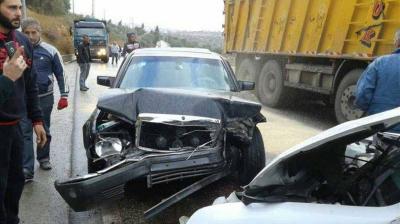The report from the Traffic Control Room regarding traffic accidents on the roads of Lebanon resembles an obituary; almost no day passes without recording victims among the dead and injured on these deadly roads in a hellish state. Despite various causes, the main reason can be summarized in one word: "Neglect." Neglect from the concerned authorities in the country, particularly the ineffective ministries responsible for their duties, as well as from citizens who do not adhere to traffic laws in a state where the meaning of law has vanished. Lebanese youth are dying in absurd and horrific ways, leaving their families and loved ones in deep sorrow. Recently, a tragic accident occurred in the Kessrouan area of Faitroun, involving a BMW and an SUV, leading to a significant fire caused by highly flammable materials in the vehicle, resulting in the death of two young men, Karl Shediac and Rami Auda, both 26 years old. Shediac had returned to Lebanon for the holidays, having been living in Paris for his studies, yet death awaited him at the crossroads of death.
Many others have also left behind deep sorrow in Zouk Mikael, among them singer George Al-Rassi and his girlfriend, who tragically perished in a horrible car accident months earlier. While speeding or distraction from phones are significant contributors to accidents, the poorly lit and dangerous roads of Lebanon are a main cause that cannot be overlooked.
What do the singers say? The founder of YASA, Ziad Akel, confirms to "Al-Markazia" that "Lebanon is facing a significant problem regarding road safety, which is likely to worsen due to several factors. The economic collapse has affected the citizens' ability to maintain their vehicles and the state's capacity to fulfill its responsibilities, compounded by long-standing issues." He points out that "municipalities have never given adequate attention to road safety, and the traffic management agency suffers from numerous problems; we don’t know the rulings the judiciary will impose regarding it, especially on those who issued driving licenses illegally. Moreover, mechanical inspections have ceased, which is also a huge scandal, indicating we have returned to the situation of the 1990s." Akel notes additional issues related to inadequate lighting and the lack of traffic signals on the roads, especially in Greater Beirut due to halted maintenance contracts, resulting in the waste of tens of millions of dollars. He also mentions problems related to stolen and open manholes, which pose traps on the roads where motorcycles or pedestrians may fall if they are on the sidewalk.
He adds: "We cannot overlook the issues related to citizens’ behaviors, who think accidents only happen to others. Therefore, we, as YASA, urge every citizen to consider themselves susceptible to accidents to become more aware and adhere to traffic laws and regulations." Akel asserts that "comparing traffic accidents in Lebanon with developed countries, a simple calculation based on one hundred thousand people reveals approximately 20 fatalities in Lebanon compared to a range of 4 to 6 in Europe, indicating that the rate in Lebanon is significantly higher than in developed countries concerning traffic safety-related losses."
On his part, researcher Mohammed Shams Al-Din from the International Information Center confirms to "Al-Markazia" that traffic accidents have declined in number and fatalities from last year, possibly due to increased citizen awareness of safety or reduced traffic flow, leading to a 33% decrease this year compared to last year. The number of fatalities last year was 392, now 324, while injuries dropped from 3249 to 2213, indicating a decrease in traffic accidents and resulting casualties in 2022 compared to 2021. He emphasizes that "traffic accidents do occur, and statistics need to be based on the whole year, not just one day." Regarding road conditions, Shams Al-Din points out that "the state of the roads is worse, with fewer protections in place; however, traffic flow has decreased, so it’s natural for the number of accidents to drop. When 100,000 vehicles are on the roads instead of 500,000, accidents will naturally decrease due to the crisis or because citizens had more errands to run before, along with significantly high fuel prices. These are all influencing factors. Citizens are also aware that their vehicle’s mechanical condition is poor, leading them to reduce their speed, since speed is the main reason for accidents; when this reality exists, accidents decrease."
Nevertheless, Shams Al-Din confirms that "the condition of the roads is much worse than before, filled with potholes causing significant vehicle damage, with no lighting at night, and no illumination. However, despite all this, it can be said that the percentage of traffic accidents has decreased from last year, considering all these factors."




